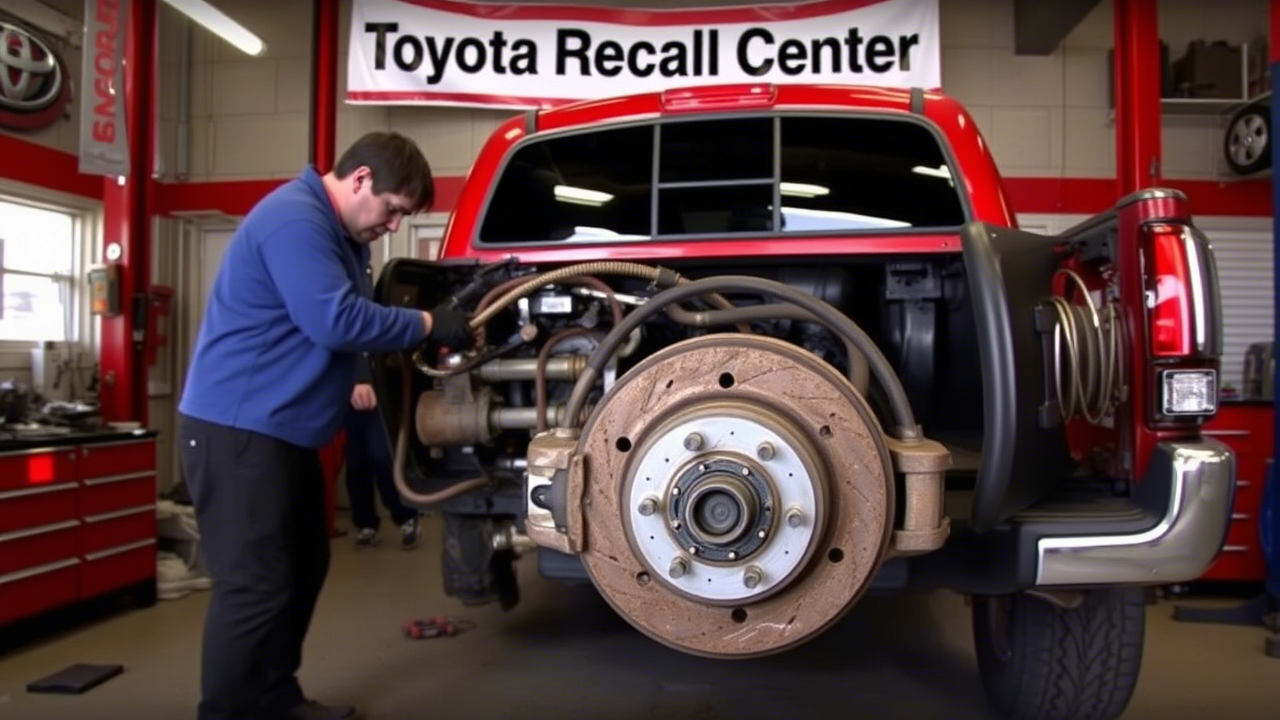Toyota, one of the most trusted names in the automotive industry, has issued a recall affecting thousands of Tacoma trucks due to potential brake line issues. This latest development has raised concerns among owners and enthusiasts alike, as brake systems are critical to vehicle safety. In this article, we’ll explain what you need to know about the recall, why it matters, and what steps affected owners should take to ensure their vehicles remain safe and roadworthy.
What Triggered the Recall?
Brake Line Corrosion: A Serious Safety Risk
The recall stems from reports of excessive corrosion in the brake lines of specific Tacoma models. According to Toyota, prolonged exposure to road salt and harsh environmental conditions can cause the brake lines to weaken over time. If left unaddressed, this corrosion could lead to brake fluid leaks, reduced braking performance, or even complete brake failure—a scenario no driver wants to face.
The issue was first flagged during routine inspections and customer complaints. Toyota’ss engineering team quickly identified the root cause and initiated the recall to prevent accidents or injuries.
“Safety is our top priority,” said a Toyota spokesperson. “We’re taking proactive measures to address this concern and ensure our customers can confidently drive.”
While no crashes or injuries have been directly linked to the defect, the potential risks are significant enough to warrant immediate action.
Which Vehicles Are Affected?
Models and Production Dates
The recall impacts approximately 340,000 Tacoma trucks manufactured between 2016 and 2023. Specifically, the affected models include:
- 2016–2023 Toyota Tacoma 4×2 and 4×4 models
- Vehicles sold or registered in states where road salt is commonly used, such as Michigan, Ohio, Pennsylvania, and New York.
If you own a Tacoma within this range, checking whether your vehicle is part of the recall is crucial. Toyota has already begun notifying affected owners via mail, but you can also verify your VIN (Vehicle Identification Number) on Toyota’s official recall website.
What Should Owners Do?
Steps to Take if Your Vehicle Is Recalled
If your Tacoma is included in the recall, don’t panic—Toyota offers free repairs to fix the issue. Here’s what you should do:
- Check Your Mail: Look out for an official notification from Toyota. The letter will provide details about the recall and instructions for repair scheduling
- Visit Toyota’s Recall Website: Enter your VIN online to confirm your vvehicle’sstatus.
- Schedule an Appointment: Contact your local Toyota dealership to arrange a service appointment. Technicians will inspect and replace the corroded brake lines at no cost.
Repairs typically take a few hours, and many dealerships offer loaner vehicles or shuttle services for added convenience.
Expert Insights: Understanding the Risks
Why Brake Lines Matter
Brake lines play a vital role in your vvehicle’s braking system by transporting hydraulic fluid from the master cylinder to the brakes. Any compromise in the integrity of these lines can result in diminished stopping power, increasing the likelihood of accidents.
Dr. Sarah Chen, an automotive safety expert at the University of Michigan, explained, “Corroded brake lines are hazardous because they often fail without warning. Drivers may notice symptoms like soft brake pedals or unusual noises, but sometimes there’s no indication until it’s too late.”
This underscores the importance of addressing the issue promptly. Even if you haven’t experienced any problems, having your Tacoma inspected is a wise precaution.
TToyota’sTrack Record on Recalls
A Commitment to Quality and Safety
While recalls are never ideal, they demonstrate a manufacturer’s commitment to transparency and accountability. Toyota has a long history of prioritizing safety, earning numerous awards for reliability and customer satisfaction.
In recent years, however, automakers have faced several high-profile recalls, including issues with airbags, fuel pumps, and brake lines. Critics argue that these incidents highlight the challenges of maintaining quality control across millions of vehicles worldwide.
That said, Toyota’s swift response to the Tacoma brake line issue reflects its dedication to resolving problems before they escalate. As automotive journalist Mark Reynolds noted, “Recalls are inevitable in the auto industry, but how a company handles them speaks volumes about its values. So far, Toyota seems to be doing the right thing.”
Owner Reactions: Mixed Feelings
Frustration and Relief
For many Tacoma owners, the recall has elicited mixed emotions. On one hand, there’s frustration over the inconvenience and potential safety risks. On the other hand, there’s relief that Toyota acted quickly to address the problem.
“I love my Tacoma, but this recall caught me off guard,” said John Martinez, a truck owner from Detroit. “I’m glad they’re fixing it for free, though. Peace of mind is worth more than anything.”
Others expressed disappointment with the timing, especially those who rely on their trucks for work or daily commutes. “It’s frustrating to deal with something like this when you’re busy,” said Lisa Nguyen, a small business owner. “But I appreciate that Toyota is being upfront about it.”
Final Thoughts: Stay Safe and Informed
The Toyota Tacoma brake line recall serves as a reminder of the importance of regular vehicle maintenance and staying informed about manufacturer updates. While recalls can be inconvenient, they’re ultimately designed to protect drivers, passengers, and other road users.
If you own a Tacoma affected by this recall, don’t delay—schedule your repair as soon as possible. If you’re unsure whether your vehicle has been impacted, take a moment to check your VIN online. After all, there’s no room for complacency when it comes to safety.
Toyota’s proactive approach to addressing the issue reinforces its reputation as a leader in automotive safety. By staying vigilant and responsive, manufacturers and consumers can work together to keep our roads safer.

